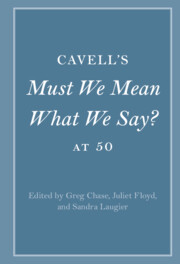Book contents
- Cavell’s Must We Mean What We Say? at 50
- Cambridge Philosophical Anniversaries
- Cavell’s Must We Mean What We Say? at 50
- Copyright page
- Contents
- Contributors
- Acknowledgments
- Abbreviations for Cavell’s Works
- Introduction
- Part I Ordinary Language and Its Philosophy
- Part II Aesthetics and the Modern
- Part III Tragedy and the Self
- 9 Philosophy as Autobiography
- 10 The Finer Weapon
- 11 On Cavell’s “Kierkegaard’s On Authority and Revelation” – with Constant Reference to Austen
- 12 Tragic Implication
- 13 Gored States and Theatrical Guises
- Bibliography
- Index of Names and Subjects
- Index of References to Cavell’s Works
13 - Gored States and Theatrical Guises
from Part III - Tragedy and the Self
Published online by Cambridge University Press: 03 March 2022
- Cavell’s Must We Mean What We Say? at 50
- Cambridge Philosophical Anniversaries
- Cavell’s Must We Mean What We Say? at 50
- Copyright page
- Contents
- Contributors
- Acknowledgments
- Abbreviations for Cavell’s Works
- Introduction
- Part I Ordinary Language and Its Philosophy
- Part II Aesthetics and the Modern
- Part III Tragedy and the Self
- 9 Philosophy as Autobiography
- 10 The Finer Weapon
- 11 On Cavell’s “Kierkegaard’s On Authority and Revelation” – with Constant Reference to Austen
- 12 Tragic Implication
- 13 Gored States and Theatrical Guises
- Bibliography
- Index of Names and Subjects
- Index of References to Cavell’s Works
Summary
Questions of authority, legitimacy, and meaning emerge in Cavell’s essay on King Lear, “The Avoidance of Love,” with reference to “Music Discomposed” and “A Matter of Meaning It.” Shakespeare raises these themes in peculiarly poignant ways, exposing them through testing the resources of theatre itself. Early in Must We Mean What We Say? Cavell is pondering problems of theatricalization, where they are related to the “all but unappeasable craving for unreality.” This puts into question the nature of the everyday and the ordinary, and the human tendency to drift into a state of “exile from our words.”
The sub-plot amplifies the questions of legitimacy and succession, democratizing these through its focus on bastardy and baseness. The problems of inheritance raised in Cavell’s discussion reverberate through ordinary language philosophy and through political settlements in the modern world. With some acknowledgment of the manner of Cavell’s participation in the “drama of the nation’s conscience,” in Ralph Ellison’s phrase, around the time he was writing the essays in this volume, the essay assesses Cavell’s contribution to the nation’s “painfully slow advance toward true equality” (again, Ellison).
Keywords
- Type
- Chapter
- Information
- Cavell's Must We Mean What We Say? at 50 , pp. 210 - 230Publisher: Cambridge University PressPrint publication year: 2022

